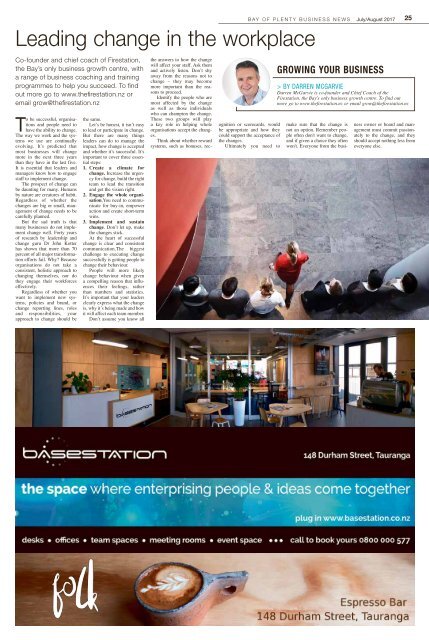Bay of Plenty Business News July/August 2017
From mid-2016 Bay of Plenty businesses have a new voice, Bay of Plenty Business News. This new publication reflects the region’s growth and importance as part of the wider central North Island economy.
From mid-2016 Bay of Plenty businesses have a new voice, Bay of Plenty Business News. This new publication reflects the region’s growth and importance as part of the wider central North Island economy.
You also want an ePaper? Increase the reach of your titles
YUMPU automatically turns print PDFs into web optimized ePapers that Google loves.
BAY OF PLENTY BUSINESS NEWS <strong>July</strong>/<strong>August</strong> <strong>2017</strong> 25<br />
Leading change in the workplace<br />
Co-founder and chief coach <strong>of</strong> Firestation,<br />
the <strong>Bay</strong>’s only business growth centre, with<br />
a range <strong>of</strong> business coaching and training<br />
programmes to help you succeed. To find<br />
out more go to www.thefirestation.nz or<br />
email grow@thefirestation.nz<br />
To be successful, organisations<br />
and people need to<br />
have the ability to change.<br />
The way we work and the systems<br />
we use are continually<br />
evolving. It’s predicted that<br />
most businesses will change<br />
more in the next three years<br />
than they have in the last five.<br />
It is essential that leaders and<br />
managers know how to engage<br />
staff to implement change.<br />
The prospect <strong>of</strong> change can<br />
be daunting for many. Humans<br />
by nature are creatures <strong>of</strong> habit.<br />
Regardless <strong>of</strong> whether the<br />
changes are big or small, management<br />
<strong>of</strong> change needs to be<br />
carefully planned.<br />
But the sad truth is that<br />
many businesses do not implement<br />
change well. Forty years<br />
<strong>of</strong> research by leadership and<br />
change guru Dr John Kotter<br />
has shown that more than 70<br />
percent <strong>of</strong> all major transformation<br />
efforts fail. Why? Because<br />
organisations do not take a<br />
consistent, holistic approach to<br />
changing themselves, nor do<br />
they engage their workforces<br />
effectively.<br />
Regardless <strong>of</strong> whether you<br />
want to implement new systems,<br />
policies and brand, or<br />
change reporting lines, roles<br />
and responsibilities, your<br />
approach to change should be<br />
the same.<br />
Let’s be honest, it isn’t easy<br />
to lead or participate in change.<br />
But there are many things<br />
leaders can do to manage the<br />
impact, how change is accepted<br />
and whether it’s successful. It’s<br />
important to cover three essential<br />
steps:<br />
1. Create a climate for<br />
change. Increase the urgency<br />
for change, build the right<br />
team to lead the transition<br />
and get the vision right.<br />
2. Engage the whole organisation.You<br />
need to communicate<br />
for buy-in, empower<br />
action and create short-term<br />
wins.<br />
3. Implement and sustain<br />
change. Don’t let up, make<br />
the changes stick.<br />
At the heart <strong>of</strong> successful<br />
change is clear and consistent<br />
communication.The biggest<br />
challenge to executing change<br />
successfully is getting people to<br />
change their behaviour.<br />
People will more likely<br />
change behaviour when given<br />
a compelling reason that influences<br />
their feelings, rather<br />
than numbers and statistics.<br />
It’s important that your leaders<br />
clearly express what the change<br />
is, why it’s being made and how<br />
it will affect each team member.<br />
Don’t assume you know all<br />
the answers to how the change<br />
will affect your staff. Ask them<br />
and actively listen. Don’t shy<br />
away from the reasons not to<br />
change – they may become<br />
more important than the reasons<br />
to proceed.<br />
Identify the people who are<br />
most affected by the change<br />
as well as those individuals<br />
who can champion the change.<br />
These two groups will play<br />
a key role in helping whole<br />
organisations accept the changes.<br />
Think about whether reward<br />
systems, such as bonuses, rec-<br />
ognition or scorecards, would<br />
be appropriate and how they<br />
could support the acceptance <strong>of</strong><br />
the changes.<br />
Ultimately you need to<br />
GROWING YOUR BUSINESS<br />
> BY DARREN MCGARVIE<br />
Darren McGarvie is co-founder and Chief Coach <strong>of</strong> the<br />
Firestation, the <strong>Bay</strong>’s only business growth centre. To find out<br />
more go to www.thefirestation.nz or email grow@thefirestation.nz<br />
make sure that the change is<br />
not an option. Remember people<br />
<strong>of</strong>ten don't want to change,<br />
and if given a choice they <strong>of</strong>ten<br />
won't. Everyone from the business<br />
owner or board and management<br />
must commit passionately<br />
to the change, and they<br />
should accept nothing less from<br />
everyone else.


















